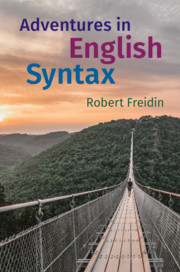‘Deeply informed and engagingly presented, these compelling adventures succeed admirably in achieving the author's intention to reveal ‘something of the hidden depth and abstract nature of our knowledge of the language we speak' and to show how ‘endlessly fascinating' language is – its structure and how we can use it effectively.'
Noam Chomsky - Massachusetts Institute of Technology and University of Arizona
‘Professor Freidin's book takes the reader on a delightful journey through the intricacies and idiosyncracies of English syntax, while at the same time providing a lucid, non-technical and painless introduction to current syntactic theory. The book should go a long way towards bridging the gap between linguistic theory and the study of English, greatly enriching both areas of study.'
Ian Roberts - University of Cambridge
‘Overall, the book is inspiring for readers with or without linguistic knowledge. For readers without a linguistic background, the book approaches good/bad writing with concrete and detailed syntactic analysis using tree diagrams and color-coded text, which visually helps the readers realize and comprehend the vertical way of decomposing a sentence. For readers with some linguistic background …’
Difei Zhang
Source: Linguist List
‘A marvelous book that should become a classic of the linguistic literature for beginners, but also for those who enjoy discovering new, original and stimulating perspectives on things they believe they know or think they understand. The adventure starts with considerations about familiar and deceptively simple English phrases, such as coordination structures, and progresses to more complex syntactic areas, like questions and ellipsis. When discussing linguistic phenomena, the author is cautious to start from what we intuitively know, developing an extremely careful analysis that explains why the phrases and sentences analyzed are understood as they are. This book is unique in that it helps the reader to get familiar with the subtleties of English syntax and to acquire a basic knowledge of linguistic theory and, at the same time, is intensely pleasurable. I cannot imagine anyone not thinking after reading it, 'I want to be a syntactician' or 'I should have been a syntactician'.’
Alain Rouveret - Emeritus Professor of Linguistics, Paris-Diderot University
'This is a great book. Very clear, very well argued. … for writers in training, it would be extremely valuable. I could easily see this becoming required reading in writing classes at the undergraduate level.'
Michael D. Lemonick - Freelance science journalist and Lecturer, Princeton University



